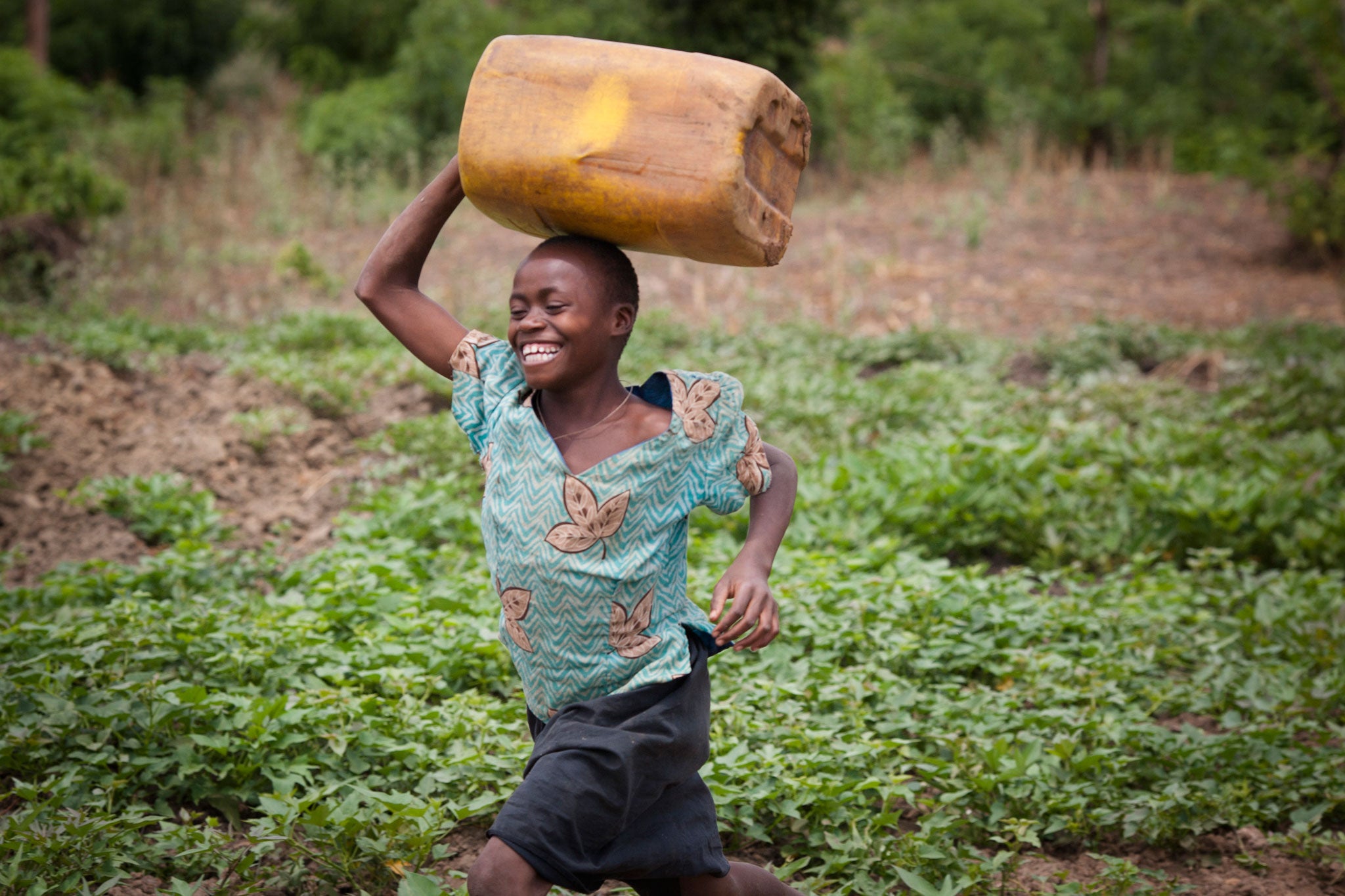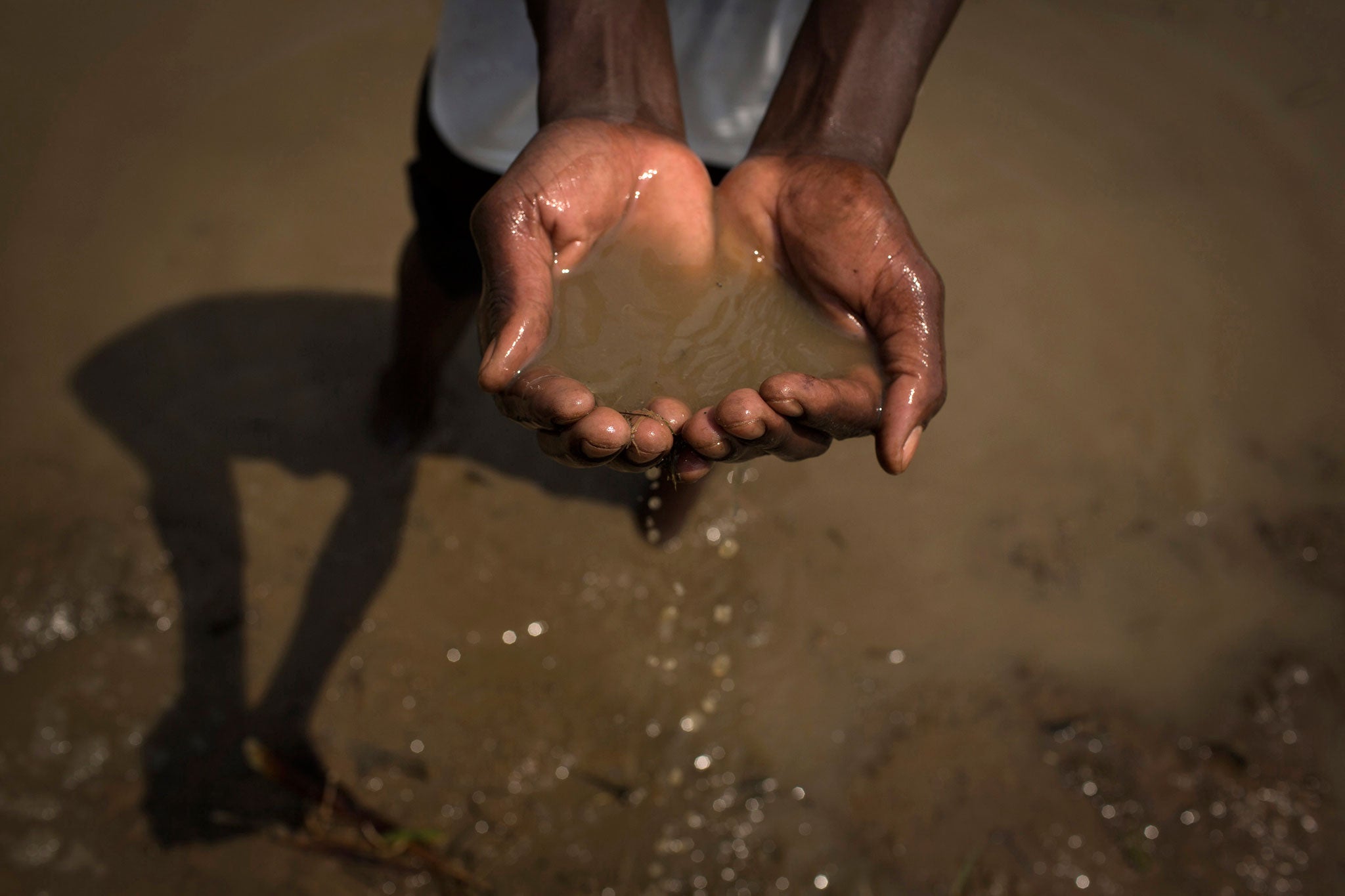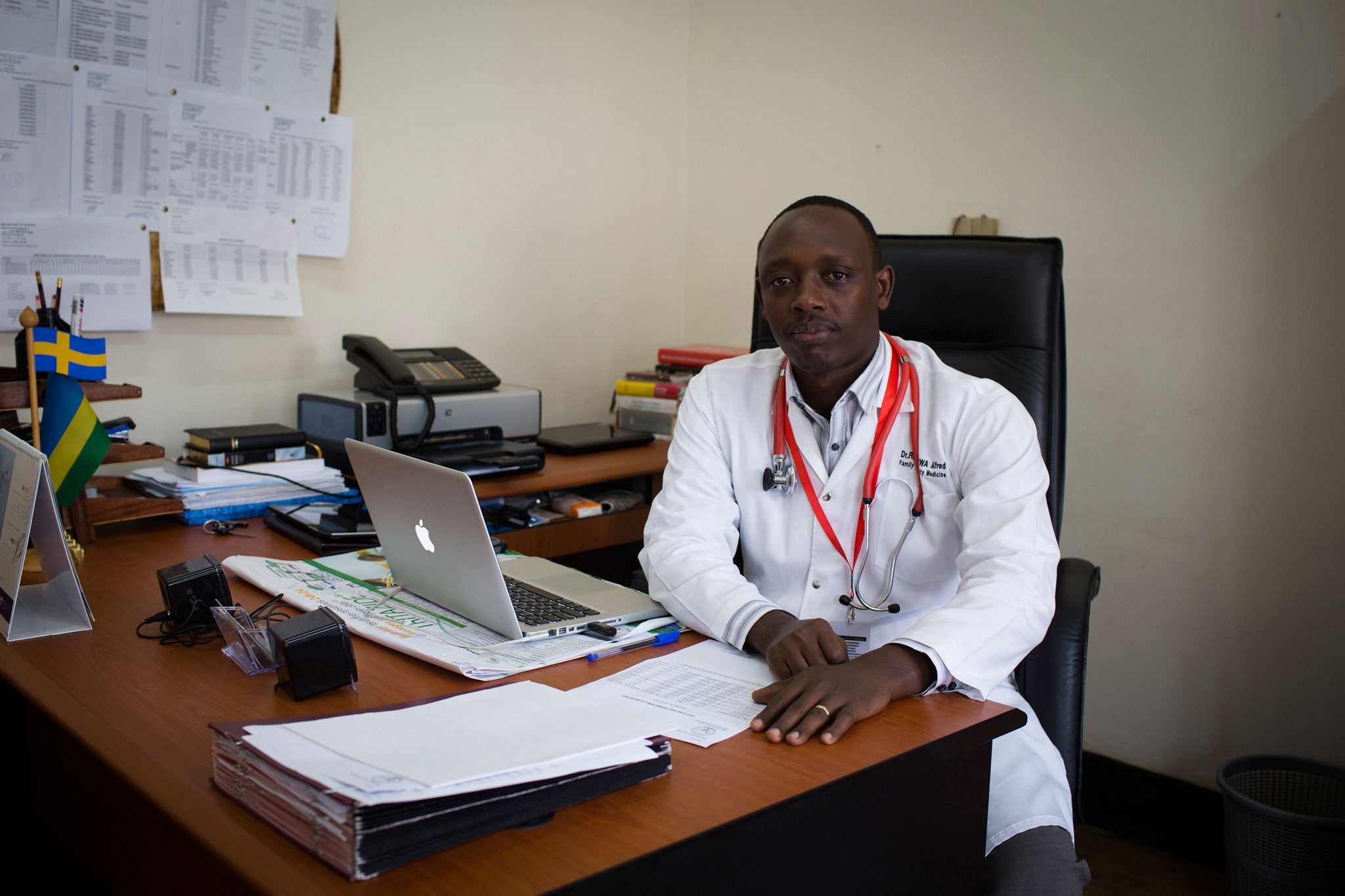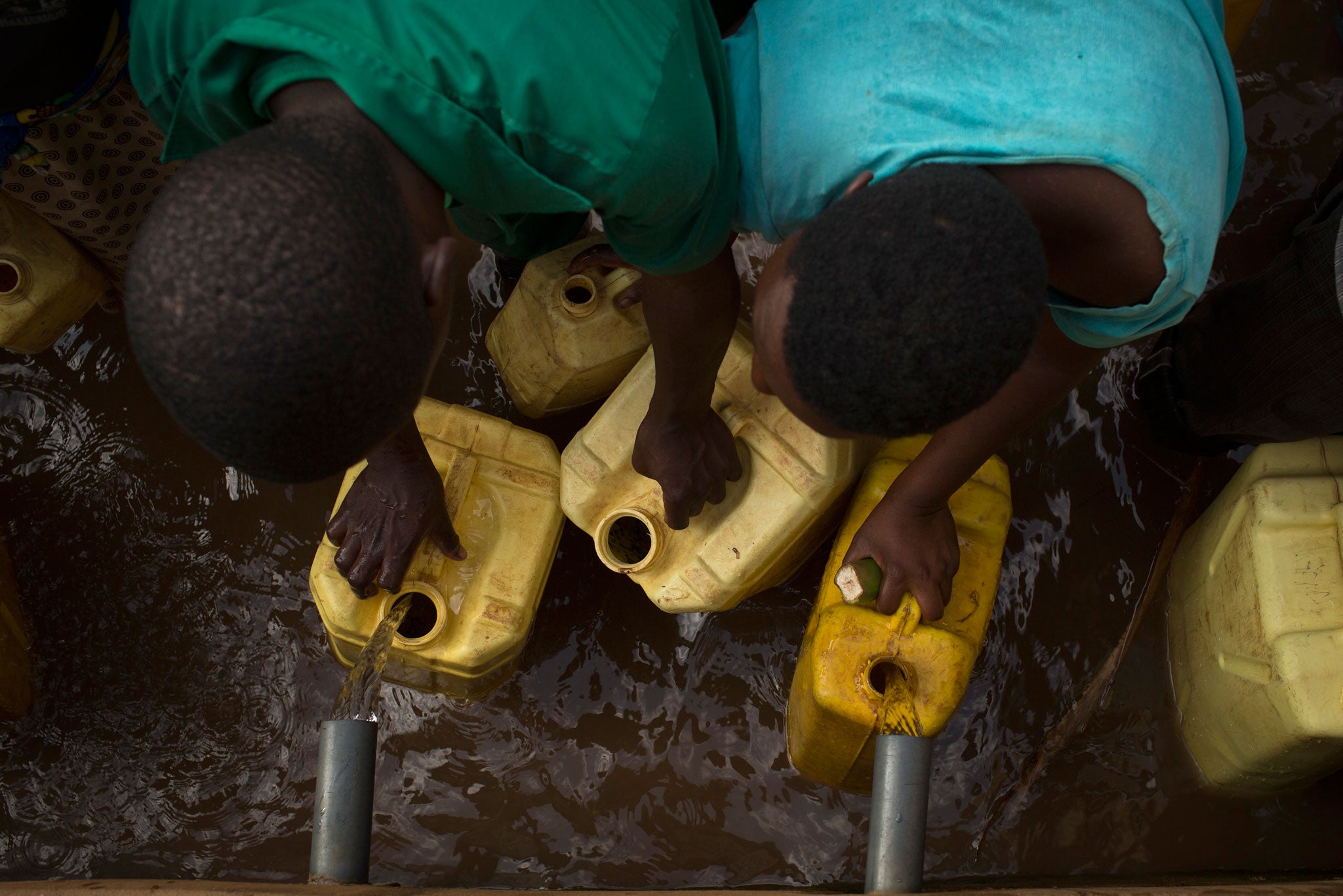Water hazard: How the UN plans to provide clean drinking water for everyone in Rwanda
As the world's leaders prepare for the 68th UN General Assembly later this month, Martin Hickman reports from Rwanda on the effects of a series of development goals set by the organisation in 2000 – and discovers that much still needs to be done to ensure clean water and sanitation for all
Your support helps us to tell the story
From reproductive rights to climate change to Big Tech, The Independent is on the ground when the story is developing. Whether it's investigating the financials of Elon Musk's pro-Trump PAC or producing our latest documentary, 'The A Word', which shines a light on the American women fighting for reproductive rights, we know how important it is to parse out the facts from the messaging.
At such a critical moment in US history, we need reporters on the ground. Your donation allows us to keep sending journalists to speak to both sides of the story.
The Independent is trusted by Americans across the entire political spectrum. And unlike many other quality news outlets, we choose not to lock Americans out of our reporting and analysis with paywalls. We believe quality journalism should be available to everyone, paid for by those who can afford it.
Your support makes all the difference.A winding path sweeps down past the banana trees to the swamp. Yves, aged 13, follows the path, fills a plastic jerry can, and carries the liquid cargo home on his head, despite knowing it will make him and his family ill. Fortunately the shallow pools do not attract crocodiles, but the water must be collected before the hippos gather at dusk.
Yves and his parents live in a cement-covered mud-brick hut in Bugesera District, southern Rwanda, where they grow beans, cassava and sweet potatoes, and keep pigs, cows and goats. They fetch muddy water from the swamp up to four times a day for drinking, cleaning and watering the livestock.
Yves' father, Theonaste, 30, says: "There are very many problems with the water. It has very many impurities. Clearly it is not clean." Sometimes the family find insects floating in food cooked in the water; sometimes, the children have to stay off school ill because of the diseases they have picked up. They get skin ailments and cracked feet.
"Even the kids know that since we are getting water from the dirty place we are going to be sick," says Theonaste's wife, Florida, 27. "Usually they refuse to take it, but because they cannot do without it, they have to take it."
Dativa, who is the same age as Yves but who lives in a different part of Bugesera, walks a few hundred metres along an uneven orange-red track to a professionally sunk borehole whose pumps dispense gleaming streaks of fresh, clean liquid. Fevers no longer keep her and her four siblings off school.
Yves and Dativa live close to the Rwandan capital of Kigali, and their contrasting experiences tell the two sides of the struggle for hydration in developing countries, a world away from the piped mains water of the West. It's an epic struggle and, hearteningly, human beings are winning. According to the united nations, 2.1 billion people – one billion alone in China and India – have gained access to healthy clean water since 1990.
An estimated 760 million, however, still rely on unhygienic sources, damaging them and their children's health and education, and wider economic wellbeing. Progress is slowest overall in sub-Saharan Africa, in conflict-hit states such as Somalia and the Democratic Republic of the Congo. There are, however, also some star performers, notably Malawi, which has improved Wash (Water and Sanitation Hygiene) for almost half of its population since 1990, and Rwanda.

Rwanda is a poor, authoritarian central African state best known for its 1994 genocide when at least 500,000 people were hacked to death. In mid-August at the end of the dry season, water is sparse in the capital Kigali and even the taps of a three-star hotel unproductively sputter, spit and hiss from time to time.
Rwandans have a saying they are fond of quoting: "Water is life." But water can also mean death. According to Unicef, the UN children's organisation, dirty water and poor sanitation and hygiene are the major causes of diarrhoea, which kills 2,000 children under five every day.
Three years ago, a British charity built the borehole at Nyamigende, where Dativa's family live in a mud-brick house with no electricity, and grow beans, sweet potatoes and bananas. She sometimes has to wait in line for three hours for the freshly pumped water – but it's preferable to walking miles to the fast-flowing River Akegera.
Watching the hand-operated pump spew water into the 20-litre yellow cans is an uplifting scene in the tableaux of global development. And hundreds of millions of Africans and Asians can thank, in part, the Millennium Development Goals (MDGs). In 2000, the year of Yves and Dativa's birth, the leaders of the world's 189 countries gathered at the United Nations in New York and agreed to end poverty through the 15-year MDGs. In New York this month, David Cameron and other world leaders will meet again to assess progress and to consider new targets for the next 15 years, to 2030.
Just like the contrasting stories of Yves and Dativa, the MDGs' aim to halve the number of those without clean water and sanitation by 2015 has been a story of two halves.
The water target was hit, spectacularly, five years early, in 2010, and 89 per cent of the world population now enjoys access to good water, compared with 76 per cent in 1990. It is possible that in little more than a decade, 100 per cent of the world's population will have access to clean water – reducing stomach bugs, skin diseases, childhood diarrhoea, "stunting" through malnutrition, and boosting the economies of some countries by between 1 and 7 per cent, according to the World Bank.
"It would be an extraordinary moment in human history and one that all those that have made the effort to make it happen should feel really proud of," says Barbara Frost, chief executive of Water Aid, which installed the borehole at Nyamigende. "What we've been trying to do at Water Aid is to talk about what's going on, the crisis, but also to encourage political commitment, because it would be a wonderful thing for politicians to say: 'Look, we brought this about; now everybody in the world has clean water to drink and doesn't have to live with poor hygiene with inappropriate sanitation.'"

The UN's work on sanitation, however, is way off target. Globally, 64 per cent of people have a toilet, compared with 49 per cent in 1990. But the figure in Africa is just 30 per cent. Clearly, there's still some work to do.
there are eight Millennium Development Goals (see box overleaf), including eradicating extreme poverty and hunger, universal primary education, reducing child mortality, combating HIV and malaria, and improving the environment. Progress towards achieving them is set out in the UN's latest MDG report, published in July.
Praising the "significant and substantial progress", UN Secretary-General Ban Ki-moon cited a halving of the number of people living in extreme poverty, reducing the proportion of urban slum dwellers and tackling malaria and tuberculosis. But, while lauding the water target, he pointed out that more than 2.5 billion people lack improved sanitation and one billion "continue to practise open defecation [outside, on the ground], a major health and environmental hazard".
Having somewhere to go to the toilet is important for human dignity and also stops the pollution of water courses, which causes a cycle of disease. A strong economic case can be made for investment in water and sanitation: the World Health Organization estimates that every $1 invested generates $4 in increased productivity. But despite the efforts of some (the journalist Rose George titled her TED talk on the subject: "Let's Talk Crap. Seriously"), progress is slow.
While one Rwanda health official pointed out to me that, "Sanitation is not a dirty word," Sanjay Wijesekera, head of Unicef's water and sanitation programme, explains: "It isn't about infrastructure, and in some ways that actually makes it more difficult. So there are two elements. One is that politically sanitation is not an attractive prospect for a policy-maker or a leader to take on, in comparison to more infrastructure-type interventions, like roads. The second thing is that traditionally governments and international agencies have been less good at behaviour change; it's difficult."
Unicef is training communities to end the practice of open defecation and encouraging individual households to dig basic latrines – and, in effect, stigmatising anyone who doesn't fall in line – though that's not how Unicef puts it. "It's not focusing on an individual but on an entire community and making that community want to eliminate open defecation as a practice, so it becomes the social norm," says Wijesekera. The motivational message is that digging a latrine brings self-esteem, dignity and privacy.

As well as causing ill health, open defecation – as with travelling long distances to collect water – makes women vulnerable to sexual predation. Describing the situation as "almost unimaginable" to Westerners, Lynne Featherstone, the UK's International Development minister with responsibility for Wash, explains: "If you are a woman or a girl, you would have to wait until dark and go outside your village so you could have some privacy to defecate in the open; you would expose yourself to violence or the threat of rape. In the UK, you go into the kitchen and turn the tap on; you can't imagine the sort of danger created by that not being available, yet so much of the world is in that condition."
Britain has doubled its target for ensuring access to water and sanitation hygiene by 2015, from 30 to 60 million people worldwide.
Paul Kagame, who commanded the rebel Rwandan Patriotic Front which ended the genocide, has been president of Rwanda since 2000. Under his forceful administration, the nation of 10 million has developed fast, with low corruption and GDP growing at 10 per cent annually. Officials make a point of praising Kagame's "strong leadership" – though his government has been heavily criticised by NGOs for authoritarianism.
In his HQ, the Mayor of Bugesera, Louis Rwagaju, says he and other officials have "accountability" to the government for hitting development targets. Central to that is achieving targets on Wash. Currently, compared with other sub-Saharan countries, Rwanda has a high rate of access to water (69 per cent) and sanitation (61 per cent). Yet one in eight Rwandans relies on drinking surface water – like the swamp visited by Yves.
Health clinics across Bugesera, one of landlocked Rwanda's most drought-prone districts, see plenty of patients suffering from water-borne disease. In Juru Health Clinic, nurse Innocent Hagumakwika treats children dehydrated by diarrhoea with glucose-fortified salts. He says diarrhoea is the second-biggest cause of cases at the clinic, after "cough", caused by the orange-red dust which kicks up from the k road with passing traffic. "We are still having children who are dying because of diarrhoea," adds Dr Alfred Rutagengwa, family physician and director of Bugesera District Hospital; sometimes the hospital cancels operations because there is no water to sterilise instruments.
Increasing access to water has reduced disease. According to the hospital, the number of cases of water-borne disease across the district's population of 363,000 fell from 52,647 in 2008 to 41,175 in 2011. Last year, it was 9,640.

The steep fall coincided with the introduction of full-time environmental-health officials in villages, each responsible for as many as 100 households. Sam Ruzindana, the district's Wash co-ordinator, explains that they spread the message about hand-washing and other hygiene practices – including the need to have a latrine advocated by Unicef. "They say: 'How many of us have toilets?' and if the response is: 'So and so has not got a toilet,' then the [officer] says, 'You are the trouble in the community, you don't have a toilet and we know that when you defecate in the open, the faeces are going to be moved to gulleys where we have water, and we all suffer because of one individual or household.' So at the end of the day, they come up with a collective response to the problem."
The mayor plans to build a new £3m water- treatment plant by 2017, by which time he hopes everyone will have access to water, not just the 70 per cent he hopes to reach by 2015, "because it is our right to have access to clean water. It is our right."
Miles away at Nyamigende, Dativa's family know that they are the lucky ones. As the rustling of banana leaves outside her home mimics rain, she says: "It would be very nice if everyone got access to clean water."
"The difference is that when you drink the water, you feel it is good," adds Asinati Nyirambabazi, her mother. "The malaria and the germs have reduced." She mentions the case of two boys who live in villages two hours' walk away who died collecting water from the river. She doesn't know any more about the names of the village or the boys.
Esperance Nyirahabimana does. In Kabukuba, sorghum grass for brewing the local beer is spread out on a tarpaulin, drying in the sun. A few feet away, Nyirahabimana perches on a narrow, hand-sawn wooden bench as she explains what happened, two months ago, to her 13-year-old son, Jean-Claude, and her 12-year-old brother, Daniel.
"They left school at lunch and passed Claude's grandparents', and when they reached the house, they found the grandparents' cow with no water, so they decided to give it some. The grandfather said that going to the river was dangerous so he told them not to go, but the kids resisted and went. The grand-father did not know until later. They fetched water and after the jerry cans were full, they put them on the side and went into the river to swim. Daniel went to swim first, and my son saw him drowning, and went to help him. They drowned together." The bodies are still missing.
"At the start when I heard of the incident I didn't believe it and didn't want to accept what had happened," continues Esperance, who has two other children, Mutsyimana, 13, and an eight-year-old boy, Irakiza. "I felt tempted to get drowned in the river, so that I would die together with those two children, but people came and tried to convince me that death is part of life and you have to move on with life. The neighbours spent two weeks here; people told me later that I had almost lost my senses. Now I realise I have to move on. I am ready to go on with the two children I have and, God willing, maybe they will grow up." Water is life.
For more: wateraid.org/uk
United we stand: What are the Millennium Development goals?
The UN's goals by 2015 are to…
* Eradicate extreme poverty and hunger.
* Achieve universal primary education.
* Promote gender equality.
* Reduce child mortality.
* Improve maternal health.
* Combat HIV/AIDS, malaria and other diseases.
* Ensure environmental sustainability.
* Develop a global partnership for development.
Which goals have been achieved?
Extreme poverty was halved by 2010, while living conditions have improved radically for more than 200 million people. Progress has also been made in treating malaria and TB, and there is more treatment available to people with HIV. The target of halving the number of people who suffer from hunger is within reach.
Which targets are out of sight?
More still needs to be done on environmental sustainability and maternal deaths. One key criticism is that progress has been unequal and the most vulnerable have been left behind: more than 80 per cent of deaths of young children happen in Africa and South Asia, while under-fives in the countryside are nearly twice as likely to die as those in cities.
What happens after 2015?
Sustainable development is to become a guiding principle. New target areas will include climate change, the challenges of urbanisation and enhancing the contribution of migrants.
Isabelle Gerretsen
Join our commenting forum
Join thought-provoking conversations, follow other Independent readers and see their replies
Comments